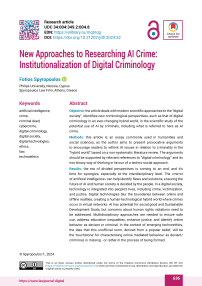New Approaches to Researching AI Crime: Institutionalization of Digital Criminology
Автор: Spyropoulos F.
Журнал: Journal of Digital Technologies and Law @lawjournal-digital
Рубрика: Государство и право. Юридические науки
Статья в выпуске: 2 (3), 2024 года.
Бесплатный доступ
Objective: the article deals with modern scientific approaches to the “digital society”, identifies new criminological perspectives, such as that of digital criminology in an ever-changing hybrid world, in the scientific study of the potential use of AI by criminals, including what is referred to here as AI crime. Methods: this article is an essay commonly used in humanities and social sciences, as the author aims to present provocative arguments to encourage readers to rethink AI issues in relation to criminality in the “hybrid world” based on a non-systematic literature review. The arguments should be supported by relevant references to “digital criminology” and its non-binary way of thinking in favour of a techno-social approach. Results: the era of divided perspectives is coming to an end, and it’s time for synergies, especially at the interdisciplinary level. The «mirror of artificial intelligence» can help identify flaws and solutions, ensuring the future of AI and human society is decided by the people. In a digital society, technology is integrated into people’s lives, including crime, victimization, and justice. Digital technologies blur the boundaries between online and offline realities, creating a human-technological hybrid world where crimes occur in virtual networks. AI has potential for social good and Sustainable Development Goals, but concerns about human rights violations need to be addressed. Multidisciplinary approaches are needed to ensure safe use, address education inequalities, enhance justice, and identify online behavior as deviant or criminal. In the context of emerging technoethics, the idea that this unofficial norm, derived from a popular belief, will be the ‘touchstone’ for characterising online mediated behaviour as deviant/crimninal, is missing - or rather in the process of being formed. Scientific novelty: the author aims to provide some insightful thoughts on formulating the right questions and interesting reflections from a technoethical perspective on the phenomenon of the use of information and communication technologies for criminal purposes under the catalytic influence of AI, recognising the social challenges arising from technological disruption (e.g. prediction and prevention through the transformation of policing, increased surveillance and criminal justice practises) in “digital society”. Practical significance: some of the initial ideas of this theoretical material can be used in the elaboration of proposals for amendements and additions to the current crime legislation, as well as in pedagogical activity, especially in the implementation of educational courses or modules on crime in the context of the digital transformation of society.
Artificial intelligence, crime, criminal deed, cybercrime, digital criminology, digital society, digital technologies, ethics, law, technoethics
Короткий адрес: https://sciup.org/14130871
IDR: 14130871 | УДК: 34:004:349.2:004.8 | DOI: 10.21202/jdtl.2024.32


